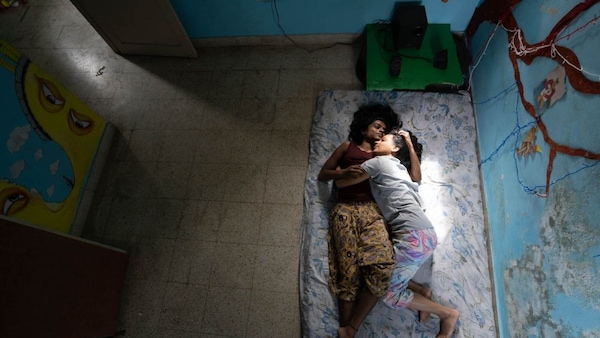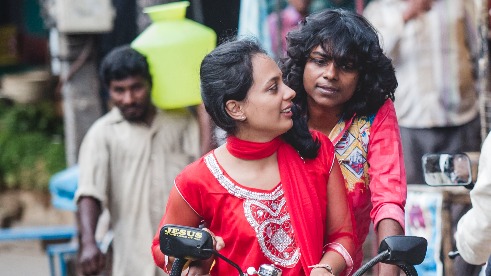Exclusive! Naanu Ladies is a lesbian love story that aims to redefine family values: Shailaja Padindala
The openly queer filmmaker has used instances from her own life to weave together this dark comedy that she has also acted in.

Last Updated: 12.20 PM, Sep 28, 2021
Shailaja Padindala’s first attempt at filmmaking was a short film that was conceived as a full-length feature, but had to be curtailed, simply because no one would back it. Eventually made as a 10-minute Malayalam film, Memories of Machine, was controversial from the word go. Starring Kani Kusruthi, Memories of Machine was lapped up at festival circuits, but also generated quite a bit of outrage for supposedly condoning pedophilia. The film was, after all, an account of a young woman’s sexual awakening, sparked by an encounter with a school peon, when she was a child.
It has been five years since and Shailaja is now set to present her second outing as filmmaker. This time around, it is a Kannada feature film that she has acted in as well, which is set to premiere at the Tasveer South Asian Film Festival (TSAFF) on October 1 in Seattle. Called Naanu Ladies, this, says Shailaja, will be a Kannada film about a lesbian love story, brought to the screen by a queer filmmaker.

Presenting Naanu Ladies
A proud member of Bengaluru’s LGBTQIA+ community, Shailaja wrote Naanu Ladies as a dark comedy in 2017, as a follow-up to the short she made. “Naanu Ladies is a story that is heavily inspired by my own life experiences, which I have attempted to present in a humorous fashion. I have written, directed and even acted as one of the protagonists. In Indian cinema, more often than not, queer subjects are not treated with the sensitivity they require and border on homophobia or derogatory comedy. There is just so much misrepresentation of the community on reel. In south India, though, there have been attempts like Naanu Avanalla Avalu. Super Deluxe and Awe, for instance, that have not only tried do justice to the community, but also with mainstream actors like Sanchari Vijay, Vijay Sethupathi and Nitya Menen acknowledging queerness. As a queer filmmaker, it is my responsibility to showcase stories from the community in the right light and sensitize society about the importance of inclusivity and treating everyone as equal,” says Shailaja.
Naanu Ladies, she adds, is her attempt at questioning family values and cultural elements of society. “It is a love story between two women and how their relationship has to not only take on society, but also sustain through the socio-economic conditions of a middle-class life,” she says, adding, “I have used some of the most beautiful as well as embarrassing moments from my life in the narrative of Naanu Ladies. For instance, my androgynous appearance has been a life-long challenge for not being girlie or manly enough – my non-binary appearance confused people and their heteronormative cultural values. My mother and grandmother, though, were my biggest pillars of support, constantly telling me that I was beautiful in my own ways, which gave me a lot of strength to accept myself. The core strength of any human being comes from his/her family and if that is strong, nothing else can shake you. In that sense, Naanu Ladies redefines family and the values that we practice in our homes.”
An androgynous body type or tomboyish behaviour is not entirely unacceptable and often overlooked as something that will rectify itself in due course of time. The more difficult aspect is sexuality that does not conform to a ‘normal standard’. How supportive was Shailaja’s family when she came out as lesbian? “I came out to my family way back when I was an undergraduate student at the Chitrakala Parishath in Bengaluru. And truth be told, it was not a very nice scene. No Indian family will congratulate you and welcome you with open arms if you come out as queer. It was a struggle for me and my family to accept each other; it has taken us years to come to terms with it. I think financial independence plays a major role here; once I could take care of my own life, things fell in place,” says Shailaja.
Mainstream showbiz’ role in uplifting LGBTQIA+ community
Films about queer stories are still like needles in a haystack, often made by members of the community, like Onir or Shailaja, for instance. Irrespective of who makes, it though, some of the better representations of stories from the community in recent times have banked on mainstream actors. Why’s that? “Acting is a craft and while having queer artistes play those roles would be ideal, you just cannot discount the reach a film with a popular actor in it has, like Super Deluxe. The way I see it, when mainstream actors acknowledge the community and play such roles with sensitivity, then, the spectrum of such subjects in Indian cinema will open up. Then, we will be in a position to cast only members of the community, instead of a straight actor pretending to be something he/she isn’t. In fact, I am hopeful of having a completely queer cast in my next film,” she says, adding, “Having mainstream actors onboard does wonders to the reach of a subject with audiences. Onir’s I Am had a theatrical release because it was a Hindi film with a wider audience base and had Sanjay Suri, Purab Kohli and Juhi Chawla – all popular in their own right – on board. “
With Naanu Ladies, Shailaja’s attempt was to treat it like a commercial subject that appeals to the audience, like comedy, songs, etc. “There are a lot of elements that Kannada audiences can relate to, yet I doubt we will do a theatrical release. Instead, following the TSAFF screening, it may head to an OTT platform,” she says.
From art to filmmaking
A graduate in painting and sculpture, Shailaja realized just how influential an artform cinema is early on and pursued post-graduate studies in cinematography from the LV Prasad institute in Chennai. What she did next, as a cameraperson for news media, not only redefined her notions of filmmaking but also honed her interest in writing and directing. “Cinematography ceased to be a priority. I wanted to make films with a new narrative and that is how Memories of Machine came about and now, Naanu Ladies, which I hope will change cultural values in every home and family towards building a better society with inclusion,” she signs off.
Subscribe to our newsletter for top content, delivered fast.
